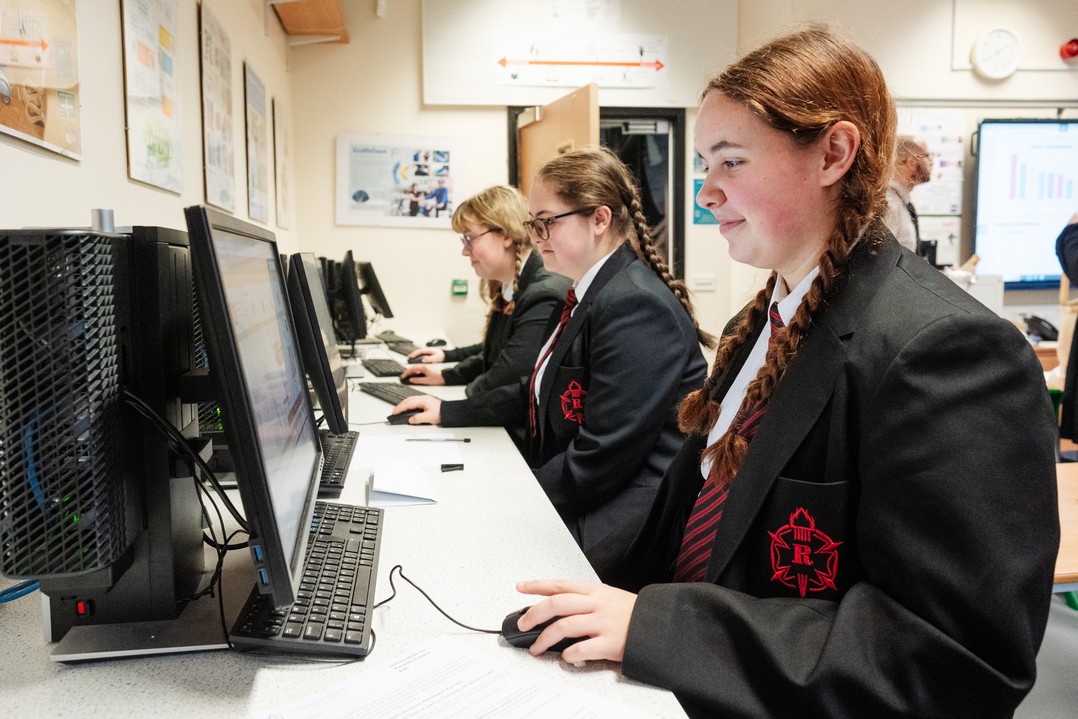Vision
The curriculum is designed to allow students to have access to transferable skills through both Computer Science and Information Technology and make informed choices on how they pursue the subjects as they continue their learning journey through the school. Computer Science should be engaging and practical, it should encourage creativity and develop problem solving skills through a variety of tasks. As active, aware and informed participants in the digital world. We also aim for the students to leave The Radclyffe School as responsible digital citizens with the skill set to keep their knowledge up to date in the ever-changing digital world. Students should be able to go online and stay safe and understand what they need to do if they do not feel safe while online.
Year 7 Curriculum Intent
By the end of Year 7 students have basic ICT competencies to be able to use computers effectively to achieve an outcome. They know the fundamentals of computer science – For example: Binary, what is an algorithm and the importance of sequencing both in computational thinking and programming. This year lays the building blocks which show them what Computer Science is about, habits needed for programming are developed here through the use of scratch. Online safety is reinforced from KS2 as technology is ever changing.
Year 7 Topics
- E-Safety & ICT skills taught as a by products, file management, PPT and Password
- Understanding Computers – Peripherals, Inputs, Outputs, Software & Hardware
- Data Representation – Introduction to Binary and Boolean
- Algorithms – Decomposition and Abstraction
- Introduction to programming, using Scratch to learn programming sequences
- Fundamentals, Computing fundamentals how ICT impacts on the real world
Year 8 Curriculum Intent
By the end of Year 8 students are able to build on concepts learnt in Year 7 with more advanced computer science knowledge. Looking at the purpose of component parts and have the ability to make a choice and justify which computer part / device would be better. They can begin to use text-based programming to create an outcome, understand the dangers of using computers and build on what they have learnt about binary in year 7 to be able to move onto adding binary numbers together, and the introduction of hex.
Year 8 Topics
- ICT Project based on a business of students’ choice creating ICT resources that a business would need
- Understanding Computers (Purpose, Justification)
- Data Representation (Ascii) – Looking at binary addition – Concept of Hex
- Algorithms – Flow Charts and programming techniques
- Programming – Introduction to text-based programming moving from Small Basic to Python
- Networks – Looking at the different types of networks and how networks work
Year 9 Curriculum Intent
By the end of Year 9 students are able to learn topics which bridge the gap between what has been covered already in Key Stage 3 and what will act as the pillars required in order to learn at Key Stage 4, Students will have more advanced Computer Science in terms of how computers work through Vonn Neumann and be able to code an outcome on their own using advanced programming techniques in Python. They will explore searching and sorting algorithms to see how an operating system uses this information. They will also investigate threats to a system/ network and prevention methods for that system/network.
Year 9 Topics
- ICT project based on a business, looking at advanced ICT skills in terms of spreadsheets and web design
- Vonn Neumann – Looking key terms of Vonn Neumann and Fetch Execute Cycle
- Data Representation – More detail (Hex, Ascii, Binary addition)
- Algorithms – 2 Searching 3 sorting Programming techniques and Pseudo Code
- Programming – Creating programs in Python
- Cyber Security – Malware, Hackers and Social Engineering
Year 10 Curriculum Intent
By the end of 10 students are able to…
- Understand the components that make up digital systems, and how they communicate with one another and with other systems.
- Understand the impacts of digital technology to the individual and to wider society.
Apply mathematical skills relevant to Computer Science
Year 10 Topics
- Memory and Storage
- Boolean Logic
- Systems Architecture
- Computer networks, connections and protocols
- Network Security
- Systems software
- Ethical, Legal, Cultural and environmental impacts of digital technology
- Programming languages and IDEs
Year 11 Curriculum Intent
By the end of Year 11 students are able to …
- understand and apply the fundamental principles and concepts of Computer Science, including abstraction, decomposition, logic, algorithms, and data representation.
- Analyse problems in computational terms through practical experience of solving such problems, including designing, writing and debugging programs
Think creatively, innovatively, analytically, logically and critically.
Year 11 Topics
- Algorithms
- Programming Fundamentals
- Producing Robust programs
- Revision
Curriculum
Updated: July 2025
The curriculum is available to view online or download below:
Computer Science KS3 CurriculumComputer Science KS4 Curriculum
Click here to view the GCSE and Equivalent Qualifications Specifications

Curriculum
- Curriculum – English
- Curriculum – Maths
- Curriculum – Science
- Curriculum – Religious Studies
- Curriculum – History
- Curriculum – Geography
- Curriculum – Computer Science
- Curriculum – Business Studies
- Curriculum – Modern Foreign Languages
- Curriculum – Drama
- Curriculum – Art
- Curriculum – Photography
- Curriculum – Health and Social Care
- Curriculum – Food Preparation and Nutrition
- Curriculum – Design and Technology
- Curriculum – NCFE Engineering
- Curriculum – Sports Studies
- Curriculum – PE
- Curriculum – Music
- Curriculum – Citizenship
- Curriculum – Statistics





